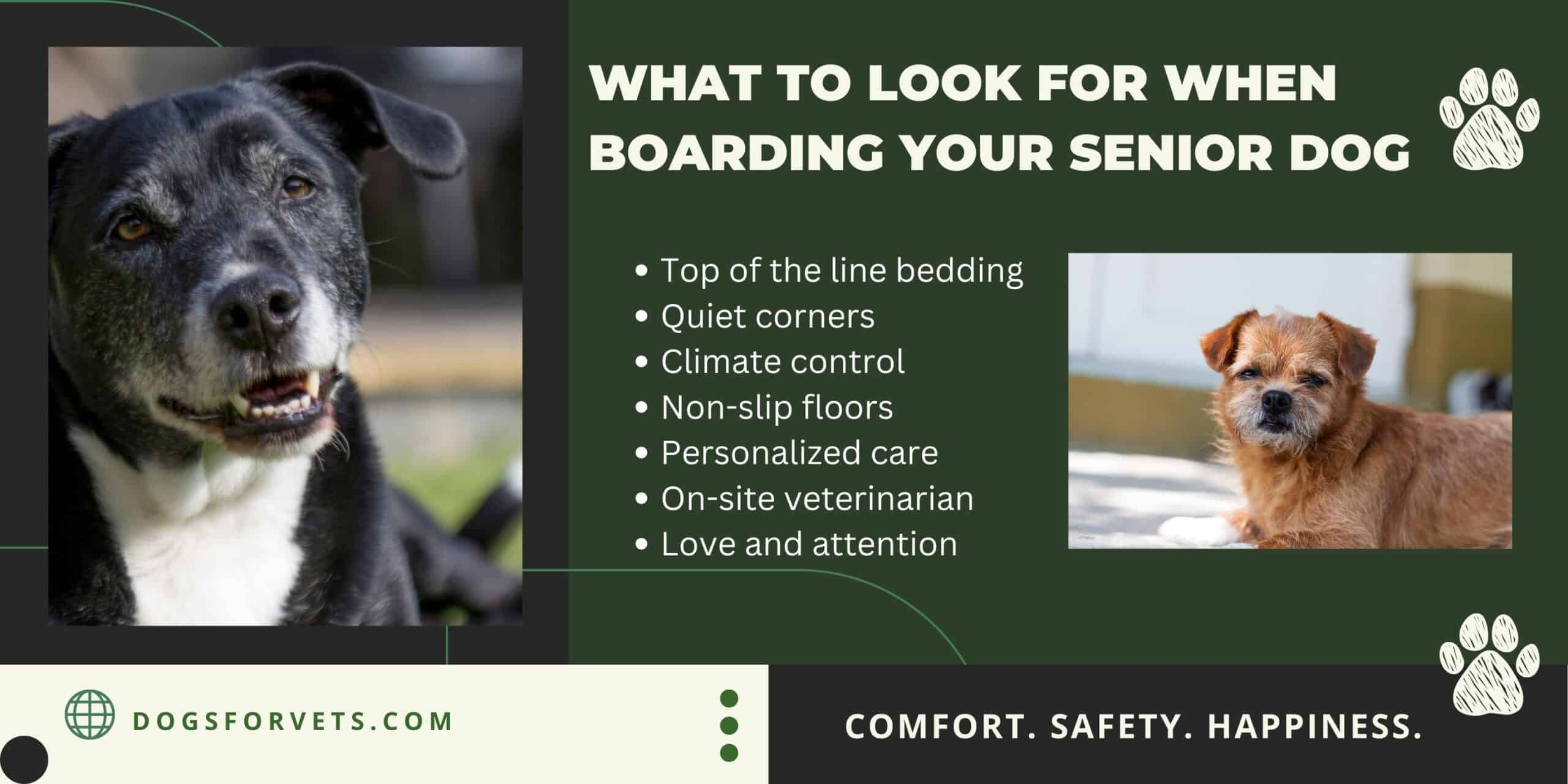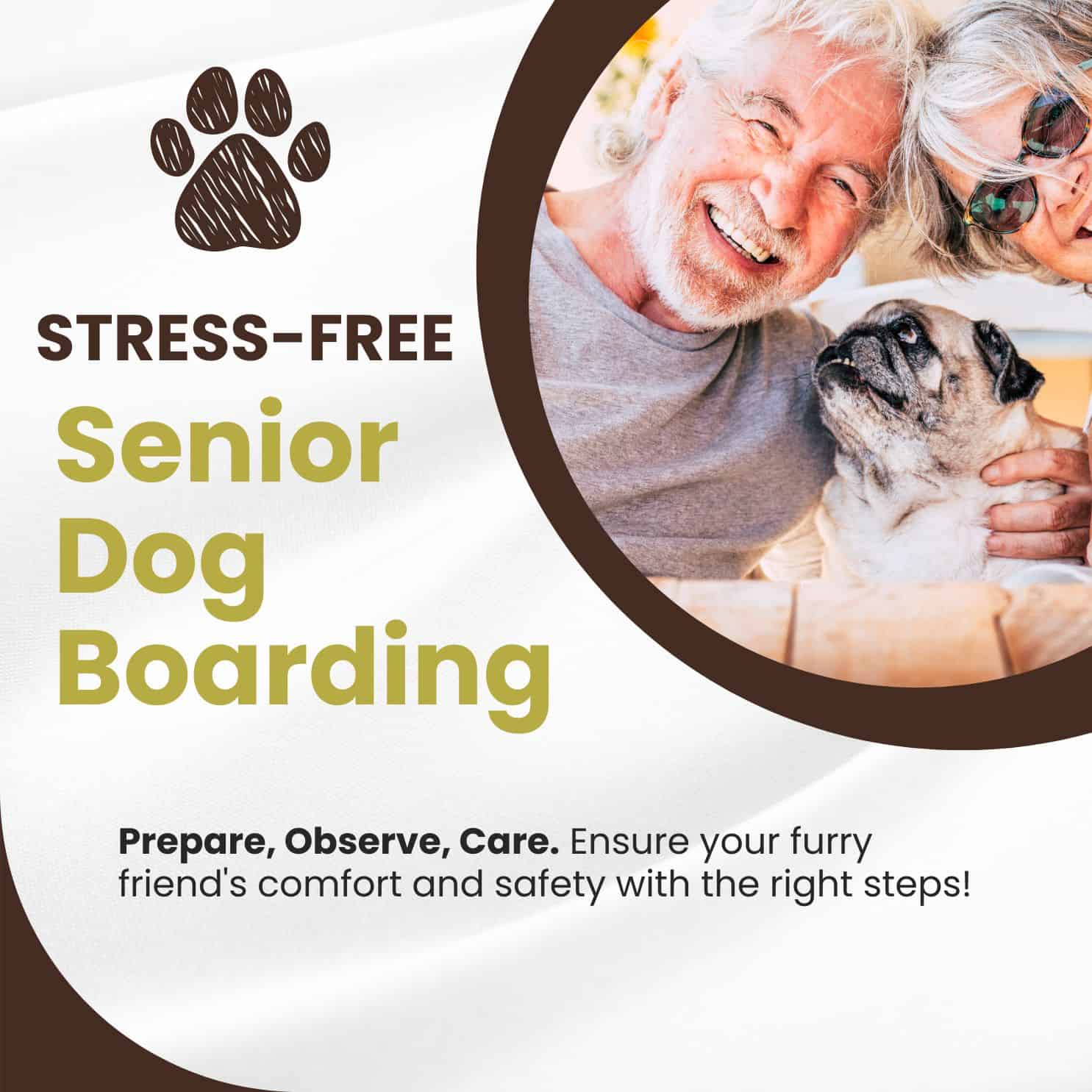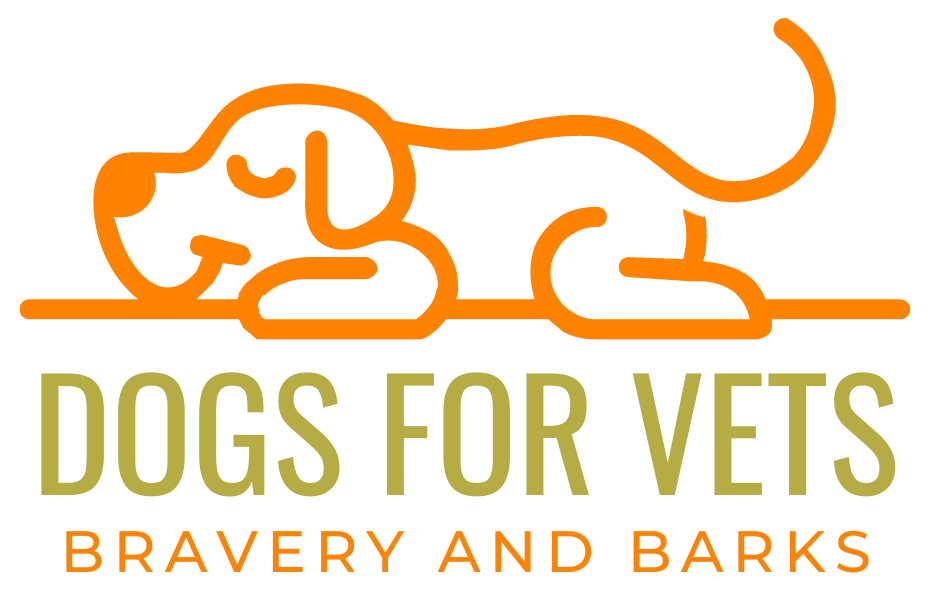This post may contain ads and affiliate links and we may earn a small commission when you click on the links at no additional cost to you. As an Amazon Affiliate, we earn from qualifying purchases. You can read our full disclaimer here.
Boarding Older Dogs: 5-Star Comfort Tips for Your Senior Pooch

Are you planning a trip but worried about leaving your senior furry friend behind? Let’s talk about how to make boarding older dogs a breeze.
Because let’s face it, they deserve a cozy stay while you’re away!
Boarding your senior dog can be a source of anxiety, both for you and your pooch. As dogs age, their needs and preferences often change, making the selection of a boarding facility an important decision.
Older dogs typically require more care, comfort, and attention to ensure their wellbeing, particularly when they are away from their familiar home environment.

Facility Must Haves When Boarding Older Dogs
When choosing a boarding option for your older dog, it’s essential to consider the accommodations and services offered.
Look for facilities that provide a comfortable, calm environment with easy access to cozy bedding. You might also want to find quieter areas where your dog won’t feel overwhelmed.
It’s also important to inquire about the availability of veterinary services and the facility’s protocol in case of a health issue. This is because older dogs may have pre-existing conditions or require special medication.
Another key aspect is the staff’s experience with caring for senior canines.
The attendants should be patient, observant, and trained in recognizing the signs of stress or discomfort in older dogs.
A good boarding facility will not only cater to the physical needs of your senior pet but will also provide the necessary emotional support and personal attention to make their stay as pleasant as possible.
Understanding Senior Dogs
As your dog enters its senior years, it’s vital for you to be aware of the shifts that can occur in their health, behavior, and daily needs.
Common Health Issues
Senior dogs often face a variety of medical conditions that require your attention.
Hearing loss and sore joints are common, as well as a general slowdown in metabolism, which can lead to weight gain.
It’s important to monitor:
- Arthritis: Soreness and stiffness in the joints.
- Dental Disease: Gum disease and tooth loss.
- Organ Function: Decreased efficiency in the heart, liver, and kidneys.
- Vision Impairment: Deterioration in sight, often leading to cataracts.
Behavioral Changes
Your aging dog may exhibit changes in behavior due to their evolving physical condition and mental acuity. Watch for:
- Decreased Activity: Less interest in play or exercise.
- Increased Anxiety: More signs of stress in unfamiliar situations or when separated.
- Sleep Pattern Changes: Sleeping more during the day and less at night.
Nutritional Needs
Proper nutrition becomes increasingly important for senior dogs. Their diet should be tailored to maintain a healthy weight and support aging organs. Consider:
- High-Quality Protein: To preserve muscle mass.
- Lower-Calorie Food: To prevent obesity since their metabolism is slower.
- Supplements: Such as glucosamine and chondroitin for joint health.
When planning meals, ensure you’re providing balanced portions suitable for your dog’s adjusted caloric needs.
Exercise and Mobility
Maintaining mobility through gentle exercise is crucial for your senior dog’s comfort and health. Encourage:
- Shorter, More Frequent Walks: Avoid overexertion with more manageable exercise periods.
- Swimming: A low-impact activity that helps with joint pain.
- Comfortable Bedding: Orthopedic beds can relieve pressure on sore joints.
Remember to adjust their exercise routine to match their current energy levels and physical capability.
Choosing the Right Boarding Facility
Selecting a suitable boarding facility is crucial for your older dog’s well-being.
Your focus should be on finding a place where comfort and cleanliness are paramount, with a reputation that stands out in the community.

Researching Boarding Options
Ensure you begin your search with thorough research to identify potential boarding kennels or daycare centers. Use resources such as:
- Local community forums
- Vet recommendations
- American Kennel Club or other reputable dog associations
Reputation and Reviews
Reputation matters. Look for facilities with positive feedback from other dog owners. Consider:
| Source | What to Look For |
|---|---|
| Online Reviews | Consistency in satisfaction |
| Testimonials | Specific praise for care & service |
| Word of Mouth | Personal experiences shared by locals |
Facility Tour and Cleanliness: A Closer Look Before You Book
Before saying “yes” to a boarding spot for your older furry companion, it’s crucial to visit the place.
This isn’t just a casual look-around; it’s detective work to ensure your dog will be in a safe and happy environment.
Here’s a detailed checklist for your tour:
- Spotless Digs: Inspect not just the kennels and play areas, but also the feeding stations and sleeping quarters. They should all be tidy and free of debris. Clean spaces mean a lower risk of diseases and a more comfortable stay for your dog.
- The Nose Knows: Trust your nose when you walk through. It should smell clean, without any harsh chemicals or unpleasant odors. This indicates regular cleaning and good air circulation.
- Watchful Staff: Observe the staff’s interaction with the pets. Are they gentle? Do they seem to know each pet’s needs and personalities? Staff should be engaging with the animals in a loving and professional manner.
- Outdoor Access: Check if there’s a safe, enclosed outdoor area for pets to enjoy fresh air and sunlight. It’s important for dogs, especially seniors, to have a comfortable space outside to relax.
- Safety Measures: Look around for safety features like secure fences, gates, and surveillance cameras. This will give you peace of mind knowing your pet is in a secure environment.
- Emergency Care: Ask about the protocol for emergencies. Knowing there’s a plan in place and immediate access to veterinary services can be a huge relief.
- Fellow Boarders: Notice the other pets staying there. Are they calm and happy? This can give you an idea of the facility’s overall vibe and the type of companions your dog will have.
Taking the time to thoroughly inspect and ask questions during your visit can make all the difference in finding the perfect boarding spot for your senior dog.
Choosing a Facility with Comprehensive Monitoring
When selecting a boarding facility for your senior dog, consider one that offers comprehensive camera surveillance, both indoors and outdoors.
This feature is not just about security; it’s about transparency and peace of mind.
Here’s what to look for:
24/7 Monitoring: Ensure the facility has round-the-clock camera coverage. This allows staff to monitor all dogs’ activities and well-being at all times.
Indoor and Outdoor Cameras: Cameras should cover all areas — from sleeping quarters and play areas to outdoor spaces. This ensures your dog is safe and well-cared for, no matter where they are.
Access to Footage: Some facilities may offer pet parents access to live feeds or recorded footage. This can give you a real-time peek into your dog’s daily life and peace of mind while you’re away.
Privacy and Security: Check the facility’s policy on privacy and data security to ensure all video footage is handled responsibly.
By choosing a facility with comprehensive monitoring, you’re not just ensuring your dog’s safety; you’re ensuring your own peace of mind.
Accommodations and Comfort: Fine-Tuning Your Senior Dog’s Stay
Securing your older dog’s comfort is paramount for a stress-free boarding experience. Don’t just ask; look closely and make sure the environment is tailored for senior comfort:
- Luxurious Bedding: Delve into the details of their sleeping arrangements. Are the beds elevated to protect against cold floors? Is the bedding thick, soft, and changed regularly? Elderly dogs need superior bedding to support their aging joints and ensure a good night’s sleep.
- Quiet Corners: Verify the availability of private, quiet spaces. Senior dogs often need breaks from noise and activity. Check if these areas are easily accessible, free from drafts, and offer a serene spot for your dog to rest undisturbed.
- Climate Control: Inquire specifically about how they manage temperature fluctuations. Is the facility equipped with air conditioning for hot days and heating for cold nights? Ensure there are no hotspots or cold drafts that could affect your dog’s comfort.
- Special Touches: Look for additional comforts like soundproofing to muffle loud noises, non-slip floors to prevent falls, and ample natural light. These details can greatly enhance your dog’s sense of security and well-being.
- Personal Care: Ask how the staff personalizes care for senior pets. Do they offer extra bathroom breaks, monitor food and water intake, and provide gentle exercise? Tailored attention is crucial for the well-being of older dogs.
Doing a thorough check ensures your senior dog not only has a safe place to stay but a genuinely comfortable and nurturing environment.
Your detailed inspection and questions today pave the way for a happier, healthier stay for your beloved pet.
Healthcare and Medication Management

When boarding your older dog, it’s crucial to manage healthcare and medication meticulously. Ensuring that your pet’s medical needs are met will maintain their comfort and prevent health complications.
Routine and Medical Records
Keeping your dog safe and healthy during their boarding experience starts with thorough preparation, especially when it comes to their medical information and daily routine. Here’s what you need to cover:
Up-to-date Medical Records: Always have current medical records ready. This includes:
- Vaccination Records: Confirm all vaccinations are up to date. Clearly list each vaccine, the date it was given, and note any adverse reactions your dog has had in the past.
- Allergy Information: Provide a detailed list of any allergies your dog has, whether it’s to food, environmental factors, or medications. This is crucial to avoid any allergic reactions during their stay.
Administering Medications:
If your dog is on medication, their health may depend on the precise timing and dosage of their meds:
- Clear Instructions: Offer explicit instructions for each medication, including the exact times and doses. Be as clear and straightforward as possible to prevent any misunderstandings.
- Prescription Labels: Ensure all medication comes with its original prescription label attached. This helps staff verify the medication and its dosage.
- Dosage Table: Create a table or chart that clearly lays out each medication, its purpose, the dose, and the frequency. This visual aid can help prevent errors and ensure your dog gets the right care at the right time.
| Medicine | Dosage | Frequency | Notes |
|---|---|---|---|
| Medicine A | 1 tablet | Twice daily | With food |
| Medicine B | 5 ml liquid | Once daily | Refrigerate after use |
Veterinarian Coordination: Seamless Care for Your Senior Dog
Ensuring your senior dog receives continuous care, even while boarding, means setting up a solid line of communication between the boarding facility and your veterinarian. Here’s how to manage this crucial aspect:
Emergency Protocols: Discuss and understand the facility’s emergency procedures. Know ahead of time what steps they will take if your dog needs urgent medical attention. Ask whether they have a vet on call or if they will use your preferred veterinarian.
Veterinarian Contact Information: Provide the boarding facility with your vet’s contact details — including phone number, address, and after-hours contact information. Make sure they know who to call and where to go if your dog has a health issue.
Medical Authorization: Fill out any necessary forms that allow the boarding facility to seek medical treatment for your dog in your absence. This is crucial for ensuring your dog receives timely care without bureaucratic hold-ups.
Health Summary: Give a brief health summary to the boarding staff, highlighting any existing conditions, symptoms to watch for, and specific care instructions. This ensures everyone is on the same page regarding your dog’s health needs.
Pre-Stay Check-Up: Consider having a vet check-up before boarding to ensure your dog is in good health and to address any potential issues beforehand. This can also reassure the boarding facility that your pet is fit for their stay.
By coordinating effectively between your vet and the boarding facility, you can enjoy your time away knowing that your senior dog is in safe hands and that a plan is in place for any medical issues that might arise.
Emergency Preparedness: Ensuring Your Dog’s Safety
When boarding your senior dog, being prepared for emergencies is key.
Here’s how to ensure peace of mind.
Emergency Contact Details: Provide the facility with multiple emergency contacts. Include your number, a local backup, and someone out of the area, in case local lines are down.
Evacuation Plan: Ask the facility about their evacuation plan. Understand where they would take your dog in case of a local disaster (fire, flood, etc.) and how they’ll notify you.
Special Needs: Inform staff of any special needs or behaviors your dog has that might affect emergency situations, like fear of loud noises or mobility issues.
Medication and Supplies: Ensure the facility has an extra supply of your dog’s medications, plus any special food or supplies, in case of an extended emergency situation.
Identification: Double-check that your dog’s tags and microchip information are up to date with your current contact details.
By covering these bases, you’ll help ensure your senior dog’s safety and your peace of mind while you’re apart.
Creating Comfort and a Home Away From Home

When boarding your older dog, making their temporary space feel like home can significantly reduce stress and anxiety. Here’s how to create a comforting environment:
Familiar Items: Bring along their favorite blanket, toy, or even a piece of your clothing. Familiar scents can provide comfort and security in a new environment.
Routine Maintenance: Try to maintain your dog’s regular routine as much as possible. Inform the boarding staff about their usual feeding, walking, and sleeping schedules to keep your dog’s internal clock in sync.
Comfort Food: If allowed, provide your dog’s regular food to prevent digestive issues. A sudden change in diet can be stressful and unhealthy for senior dogs.
Soothing Sounds: If your dog is used to background noise like a radio or TV, ask if the facility can replicate this. Familiar sounds can be soothing and make the space feel more like home.
Personal Space: Ensure your dog will have their own space where they can retreat and relax without being disturbed. This is especially important for older dogs, who may need more quiet time.
Love and Attention: Discuss with the staff how much interaction and type of affection your dog prefers. Some dogs may enjoy extra cuddles or more frequent short walks.
By incorporating these elements, you can help create a nurturing environment that mimics the warmth and security of home, making your senior dog’s boarding experience a positive one.
Stress Reduction Strategies: Keeping Your Senior Dog Calm
Boarding can be stressful for older dogs, but with the right strategies, you can help minimize their anxiety. Here’s how to ensure a smoother experience for your furry friend:
Gradual Introduction: If possible, introduce your dog to the boarding facility gradually. Start with short visits that increase in length over time, allowing your dog to become familiar with the new environment and its caretakers.
Calm Goodbyes: Keep your departure calm and brief. Long, emotional goodbyes can increase your dog’s anxiety. A cheerful, upbeat tone can help set a positive mood.
Consistent Routine: Dogs thrive on routine. Provide the boarding facility with a detailed schedule of your dog’s daily activities, including meal times, walks, and bedtime. The closer they can stick to your dog’s regular routine, the better.
Comfort from Home: Bring items from home that smell like you or the environment they are used to. Familiar smells can be incredibly comforting to dogs and help them feel more secure.
Exercise and Play: Ensure the facility provides adequate exercise and playtime. Physical activity is a great stress reliever and can help your dog burn off nervous energy.
Relaxation Techniques: If your dog responds well to gentle music, aromatherapy, or massage, consider asking the staff to incorporate these into their routine to help soothe your pet.
Stay in Touch: If the facility allows, schedule check-ins or ask for updates and photos. Knowing your dog is okay can reduce your stress, which in turn, helps your dog stay calm.
By implementing these strategies, you can help reduce stress and ensure your senior dog has a peaceful and enjoyable stay at the boarding facility.
Special Care for Older Dogs

Older dogs have unique needs that require extra care and understanding. This section highlights how you can provide personalized attention, enrich their lives, and monitor their health to ensure their comfort and well-being.
Personalized Attention and Care
Your older dog craves personalized attention to stay comfortable during a boarding stay. It’s crucial to find a boarding facility that offers:
- A quiet space for rest away from noisy areas
- Soft bedding to ease joint pain
- Regular, gentle petting sessions to reduce anxiety and provide comfort
Senior Dog Enrichment
Enrichment is key to keeping your senior dog’s mind active. Look for boarding services that provide:
- Slow-paced, short walks to maintain muscle strength without causing strain
- Cognitive games specifically suited for older dogs
- Consistent, yet gentle interactions to foster peace of mind
Monitoring Health and Well-being
Aging dogs may have health issues that need close monitoring. Ensure the boarding facility can offer:
- Daily health checks
- Immediate veterinary care access
- A detailed daily log of your dog’s food intake, behavior, and medication schedule, if applicable
Logistics and Preparation
Ensuring smooth logistics and thorough preparation can make the experience of boarding your older dog much less stressful for both you and your furry friend.
Travel and Arrival
When traveling to the boarding facility, secure your dog in an appropriate carrier or harness to prevent falls and injuries.
- Travel Carrier: Choose a comfortable size with ample bedding.
- Arrival Time: Aim for a quiet period to help your dog settle in.
Contact Information and Updates
Provide the boarding facility with your up-to-date contact information.
- Emergency Contact: List an additional person who can make decisions for your dog.
- Update Frequency: Decide on daily or every-other-day updates.
Leaving Instructions with the Provider
Detail your dog’s individual needs, including dietary restrictions, medication schedules, and preferred activities.
- Diet: Outline meal times and portion sizes, as well as any allergies.
- Medication: Provide dosage instructions and administration times.
Ensuring Comfort and Safety
When boarding your older dog, you want to prioritize their comfort and safety. This means providing ample bedding and removing any hazards that could pose a risk to your senior pet.
Providing Extra Bedding and Support
Your dog will need a cozy place to rest, so extra bedding is essential.
- Bedding checklist:
- Orthopedic mattress
- Soft blankets for added warmth
- Raised beds to avoid drafts and cold from the floor
Opt for thicker, orthopedic beds that can cushion their joints and make lying down and getting up easier.
Make sure the bedding is in a size that suits your dog. Larger dogs require more space to stretch out, while smaller dogs might prefer a snugger area.
Regularly change the bedding to ensure cleanliness and comfort.
Identifying Potential Hazards
Older dogs may not see or hear as well as they used to, which means it’s crucial to clear the area of dangers.
- Hazards to remove:
- Slippery surfaces: Provide non-slip mats or rugs.
- Sharp objects: Check the area for anything that could cut or scrape your dog.
- Toxic substances: Keep cleaning agents, medications, and toxic plants out of reach.
- Small items: Remove any small objects that could be a choking hazard.
Ensure water bowls are easily accessible and not likely to be tipped over, reducing the risk of spills that could cause slips.
In the exercise area, avoid too much rough play, which could lead to injuries.
Post-Boarding Considerations
When your senior dog returns home from a boarding service, it’s essential to help them readjust and reflect on their stay. This involves ensuring their comfort and reviewing the care they received.
Transitioning Back Home: Easing Your Senior Dog’s Return
Coming home after boarding can be a period of adjustment for your older dog. Here’s how to make the transition as smooth as possible:
Welcome Calmly: When you pick up your dog, maintain a calm and happy demeanor. Overexcitement can be overwhelming, especially for senior dogs.
Re-establish Routine: Get back into your normal routine as quickly as possible. Consistent meal times, walks, and bedtimes can help your dog feel secure and settled.
Monitor Health: Keep an eye on your dog’s health and behavior in the days following their return. Look out for signs of stress or illness, and contact your vet if you have any concerns.
Quiet Time: Allow your dog plenty of quiet time to rest and recuperate after their stay. They may be more tired than usual and need additional sleep to recover from the excitement of boarding.
Gentle Reintroduction: If you have other pets, reintroduce them slowly, even if they’ve lived together for years. Your senior dog might need time to readjust to their companions.
Positive Reinforcement: Offer lots of praise and some extra treats as your dog readjusts. Positive reinforcement can help strengthen your bond and reassure your dog that they’re back in a safe, loving environment.
By following these steps, you can help ensure a smooth and comfortable transition back home for your senior dog.

Evaluating the Boarding Experience
Reflect on the boarding service’s performance concerning your senior dog:
- Senior dog care: Determine if the special needs of your senior dog were attended to satisfactorily. This includes things like medication administration and extra comfort.
- Nutrition: Assess whether your dog’s dietary requirements were met. Look for any changes in weight or eating habits.
- Reputation: Take note of your overall impression and whether it aligns with the boarding service’s reputation. Consider leaving a review to help other pet owners.
Final Thoughts on Boarding Older Dogs
Boarding your senior dog doesn’t have to be stressful. With the right preparation, a keen eye for detail, and a little extra care, you can ensure your furry friend enjoys a comfortable and safe stay.
From selecting the right facility to preparing for emergencies and easing the transition back home, every step you take contributes to your dog’s well-being.
Remember, your peace of mind and your dog’s happiness are worth every bit of effort.
-

Coffee Mug – In Dog Coffees I’ve Only Had One
$11.95 – $14.95 Select options This product has multiple variants. The options may be chosen on the product page
